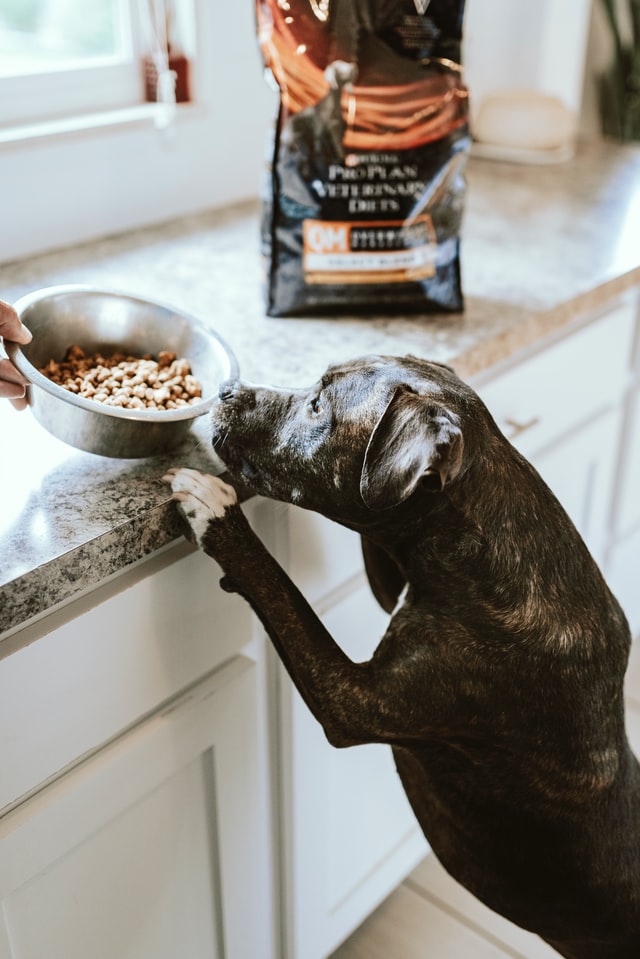Nutrition is just as important for your dog is it is for the rest of your family.
That’s why feeding your dog the right foods in the right amount can improve his quality of life and help him live longer.
Your dogs nutritional needs are similar to your own. He needs dog foods that provide protein, carbohydrates, fats, minerals and vitamins in the appropriate amounts. Depending on the stage of life your dog is in, he may require different ratios of these elements.
Deciphering Dog Foods
All dog foods are labeled as to which life stage they are intended for so you don’t need to worry about scrutinizing labels to try to figure out which one is for puppies and which for adults. When purchasing food for your dog, be sure to read the list of ingredients. Insure the food provides a balanced diet and is labelled with the AAFCO seal. The Association of American Feed Control Officials (AAFCO) regulates pet foods so you know the food you buy for your dog meets strict criteria when you see this seal on it. The ingredients on are listed in order of weight so you can determine quickly which foods have the highest amounts of the desirable ingredients. Be sure to look for “meat” or “poultry” at the top of the list.
Dry or Canned?

Your dog will probably like canned food better but dry foods may be better for him. Dry food is better for teeth and gums and much less messy especially if you tend to leave food out all day. Also canned food has more water in it, thus you are paying more for less actual food. Semi-moist dog foods are convenient but tend to have more additives and preservatives.
Dog Foods For Different Life Stages
The age and activity level of your dog should dictate the type of food that he needs. Puppies have different nutritional needs from adult dogs as do senior dogs and dogs with special needs. Below is a list of different phases of dog life and recommended foods that meet the nutritional needs for that phase
Puppies

Puppies require more protein than adult dogs. Generally, they should be eating foods that provide 28% protein and 17% fat. Check with your vet to determine what your puppies needs are and how long to keep him on puppy food as different breeds of dogs can have different lengths of “puppyhood”.
Adult Dogs

Healthy normal weight adult dogs should be getting about 18% protein and 12% fat from their dog foods. If your dog is a performance dog, like a sled dog or other working dog he will require a higher amount of protein – about 25% and about 20% fat.
Pregnant, Lactating and Sick Dogs

Dogs that are pregnant and lactating require a diet similar to puppies with 28% protein and 27% fat. Also, dogs that are weak or sick can benefit from this type of diet as well. If your dog has specific health problems, you may want to feed him foods formulated to care for his problem.
Overweight and Senior Dogs
Your senior dog has special nutritional needs and may benefit from a specially formulated senior dog foods. Seniors are less active, thus requiring fewer calories, and may benefit from a diet lower in phosphorus and a with a moderate level of fiber. If you are switching your dogs food make sure you switch foods gradually, mixing in the foods in differing amounts over a 2 week time span so that your dog’s digestive system can adjust. Less active dogs may benefit from a low fat dog food while overweight dogs need a lite dog food.
How Much Is Enough?

Overweight dogs have shortened life span and develop disease much earlier than thinner dogs of the same breed, so it is important not to overfeed your dog. Make sure you can feel your dogs ribs and that he appears trim when you look at him from above, if not he is overweight and you may want to consider one of the lite dog foods listed above. Figure out how much you should be dishing out to your pooch with this dog foods calculator.











